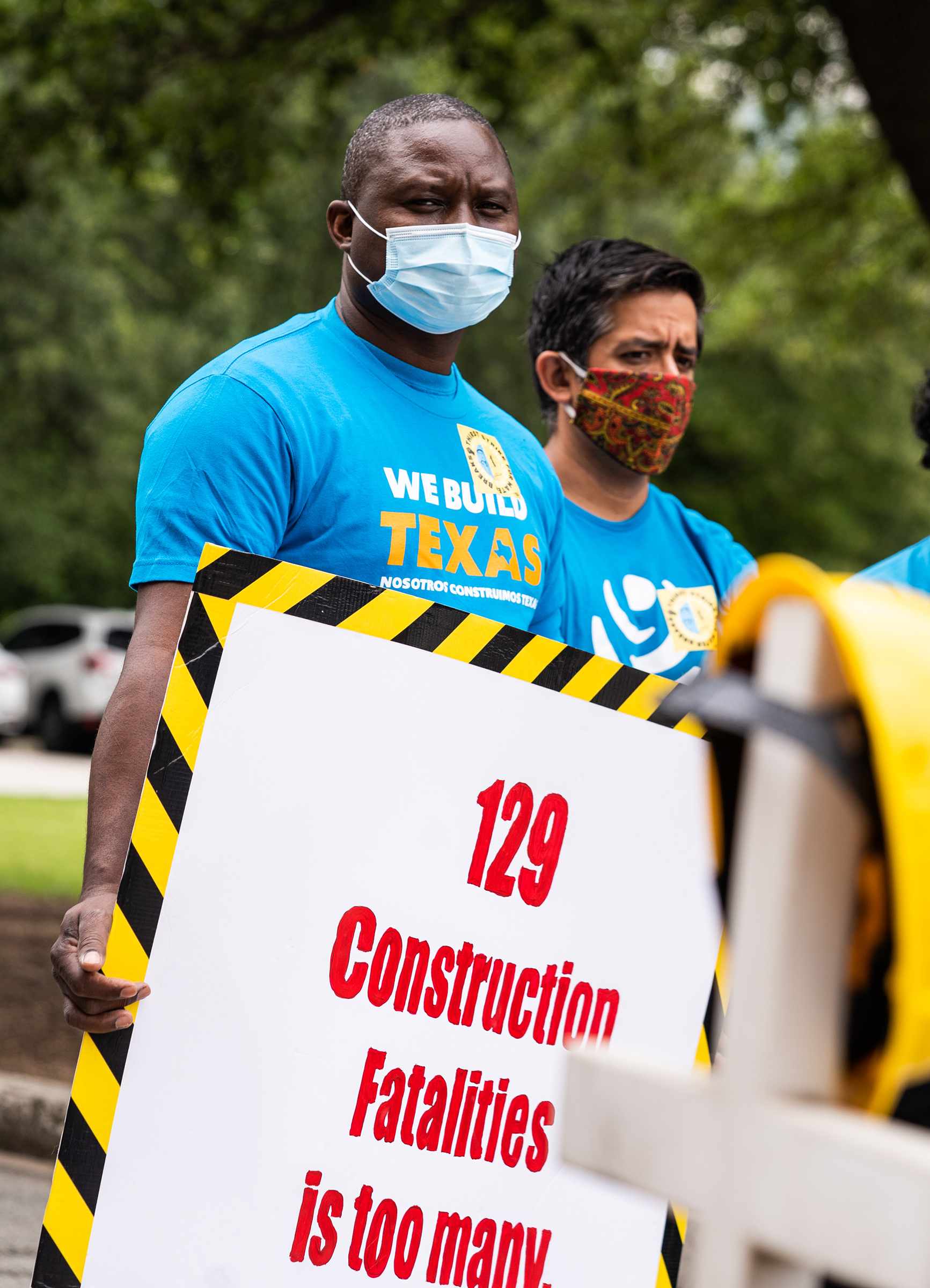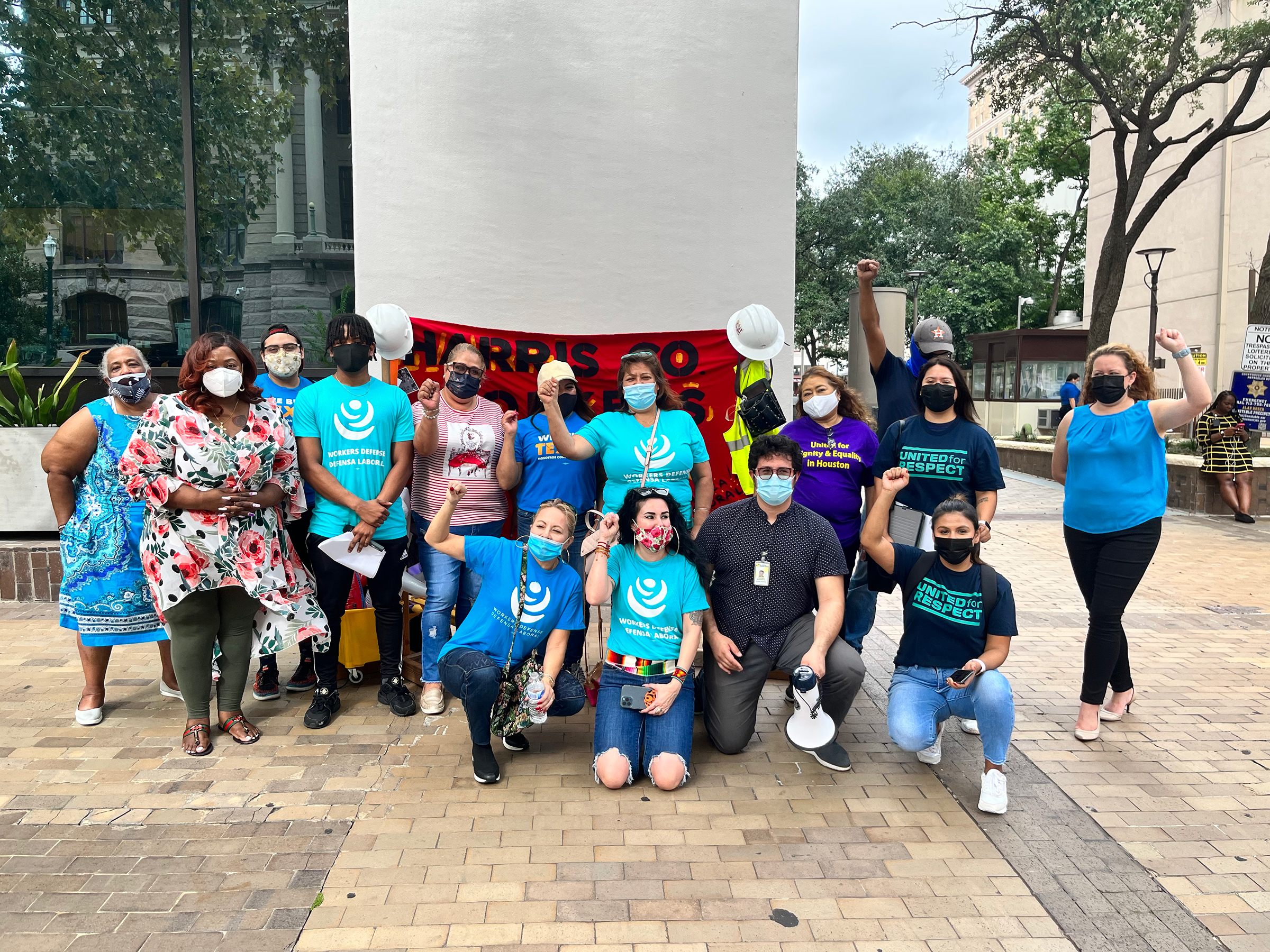
When the coronavirus pandemic began in 2020, Mercedes Taylor, an airport security officer in Houston, remembers feeling exposed. She works the overnight shift, where she interacts with airline employees, police officers, passengers, members of the cleaning crew, and a regular influx of homeless people—but she says her employer did not provide personal protective equipment or take other precautions until her union, SEIU Texas, stepped in.
Taylor, 70, worried that she would contract COVID-19 and infect her children or grandchildren, but she also worried for everyone else. As workers across other industries were, like her, deemed “essential” and asked to keep showing up at work through the pandemic, she feared for those who did not have a union to advocate on their behalf. “This is a big city and a very large county. You start to get lost and think maybe it doesn’t matter what I think,” Taylor says. “But essential workers undergird these businesses. And if we’re not there, the businesses are not going to run as smoothly as they would. So it’s really important that we’re protected, our lives are protected, our families are protected.”
A new effort in Harris County, where Houston sits, is designed to answer Taylor’s call. Next month, the county’s commissioners will choose five members to serve on a new Essential Workers Board, a local body that will offer low-wage laborers a formal say in workplace health and safety policies across the third most populous county in the U.S. The members will make non-binding recommendations to the Harris County Department of Economic Equity and Opportunity and other departments, and will advise the county’s commissioners court on how its policies and programs affect workers’ health and rights.
The Harris County Essential Workers Board is The latest effort by workers nationwide to leverage the hard lessons of the COVID-19 pandemic to advocate for better working conditions going forward. In Colorado, a coalition of farmers, scholars, unions and farmworker advocates were instrumental in passing legislation last year that established new rules around wages, hours and other protections for farmworkers. In New York, labor groups and immigrant rights organizations helped pass the NY HERO Act, which required employers to implement workplace safety plans and allow worker health and safety committees. And in California, Los Angeles County has created public health councils that allow workers across a range of frontline industries to advise their work sites on health protections and file complaints to the county Department of Public Health when they see something amiss.
These incremental changes, advocates say, are crucial not only in empowering essential workers, but in ensuring that communities are prepared in the next public emergency. “This kind of infrastructure, if it’s maintained as a more permanent structure, is going to be able to respond and help overall public safety in a proactive way,” says Aquilina Soriano Versoza, executive director of Pilipino Workers Center of Southern California, which has worked on the public health councils in L.A.
‘Heroes’ without a voice in government
For the past two years, frontline workers have been championed as “heroes” for keeping industries like transportation, grocery stores and health care operating while other Americans worked from the safety of home. While some companies offered such workers paid sick leave and hazard pay early in the pandemic, many hourly workers have born the brunt of the virus, dying from COVID-19 at disproportionate rates and often suffering financial setbacks as the economy collapsed. Public backlash to lockdowns and other pandemic precautions also led conservative lawmakers to resist public health officials’ recommendations. The circumstances helped fueled an interest in unionization among frontline workers, and encouraged others to band together to demand more proactive support from their local governments.
The Harris County Essential Workers Board was born in part of this anger. Candido Batiz Alvarez, a construction worker in Houston, says his personal experience fueled his advocacy. Last summer, he got COVID-19 at his job and spread the virus to his wife, but his employer tried to refuse him sick leave, he says. The experience propelled him to testify before the county commissioners about the need for the essential workers board with the advocacy group Workers Defense Project, and now he hopes to be one of the board’s first members.
“I feel more empowered because I know we will have an avenue to be heard as workers, as human beings, also as parents, and members of our community at large,” Batiz Alvarez says in Spanish.
When it launches in early May, the essential workers board will be made up of five low-income workers that represent industries such as transportation, construction, home care, education, grocery, and food service. The Harris County Commissioners Court will choose those first five members of the board, who will serve a term of three years, and by June, those workers will choose another eight board members, who will serve terms of one or two years. The 13-person board must meet at least once every other month and submit an annual report containing its recommendations to the Commissioners Court.
While workers cheer the board’s possibilities, complications remain. Most importantly, the board is strictly advisory and therefore lacks enforcement authority. Advocates say that’s by design: Workers wanted a seat at the table, but they also wanted a system that would be able to function in conservative states, like Texas, where state-level leaders often preempt local ordinances or policies. During the pandemic, for example, conservative governors and state legislatures prevented county public health commissioners from implementing mask mandates and stopped election administrators from loosening voting rules due to COVID-19. In Texas last year, Republican Gov. Greg Abbott championed a bill that would have not only prevented localities from protecting workers from COVID-19 hazards but also eliminated basic requirements such as 10-minute water breaks for construction workers despite intense summer heat.
For this new effort, advocates focused on including workers who have not been at the forefront of conversations about pandemic “heroes” but who have faced significant risks so they could bring their firsthand knowledge of problems in the state to the process. “Texas is the deadliest state for construction workers in the country. This is something that workers were already talking about,” says Sandra Cisneros-Peeters, an organizer with Workers Defense Project, who noted that Texas is also the only state in the country that does not require employers to provide workers compensation.
Local labor groups met regularly for months to advocate for the creation of the workers board, and in November, the Harris County Commissioners Court voted to approve the idea 3-2 with Democrats in favor and the Republican commissioners opposed. Harris County Judge Lina Hidalgo, a Democrat, told workers at a meeting in March that they would need to be creative.
“I challenge you guys to really help us figure out how to push the envelope. I don’t want to paper over the fact that we live in a state with a challenging climate toward workers with legislation,” she said. “So part of what we need to do here is think creatively about how we can push the envelope within county government and co-create and co-govern. What can we do that is possible, that is realistic, but is also smart and innovative and aggressive. And so that’s the trust that I hope we can build together.”

Preparing for the next public emergency
Workers’ efforts in other places around the country are seeing tentative success, too. In Colorado, the farmworkers bill is “really a stepping stone … for what protections can look like,” says Pamela Reséndiz Trujano, executive director of Colorado Jobs with Justice. “We know that we still have so much work to do in terms of making sure that there is actual enforcement and that it forces a cultural change within that industry.”
While the law includes a host of new protections for farmworkers in Colorado, it saw aggressive pushback from farmers and overtime regulations were watered down from what advocates initially wanted. Colorado Jobs with Justice and other advocates recently sued Colorado Gov. Jared Polis and the state’s labor department, alleging the overtime rules discriminate against farmworkers. In New York, the state Commissioner of Health recently ended the designation of COVID-19 as an airborne infectious disease that presents a serious risk of harm, which means employers are no longer required to implement the NY HERO Act’s workforce safety plans. And in L.A., the current public health council protections also only last until whenever the public health emergency declaration ends.
Still, advocates are hoping that they can use the attention that workers gained during the pandemic to keep tweaking these protections and push for them to last beyond the current moment.
“Regardless of what happens with COVID, we are going to recognize that there are airborne infectious diseases and other issues happening every day,” says Maritza Silva-Farrell, executive director of ALIGN, a community and labor group that worked to pass the New York legislation. “We cannot continue doing business in our country the way we have been. We need to learn the lessons of the pandemic and 2020 and give the essential workers not only a clap, but give them the protections and the wages that they need to be able to sustain.”
For his part, Batiz Alvarez in Houston sees the growing number of efforts around the country as a hopeful sign.
“It’s inspiring workers to pass similar boards that actually provide a voice for workers,” he says, “and for workers to be able to realize all of their dreams, like basic health and safety protections that actually make workers feel valued.”
More Must-Reads from TIME
- Cybersecurity Experts Are Sounding the Alarm on DOGE
- Meet the 2025 Women of the Year
- The Harsh Truth About Disability Inclusion
- Why Do More Young Adults Have Cancer?
- Colman Domingo Leads With Radical Love
- How to Get Better at Doing Things Alone
- Michelle Zauner Stares Down the Darkness
Write to Abigail Abrams at abigail.abrams@time.com